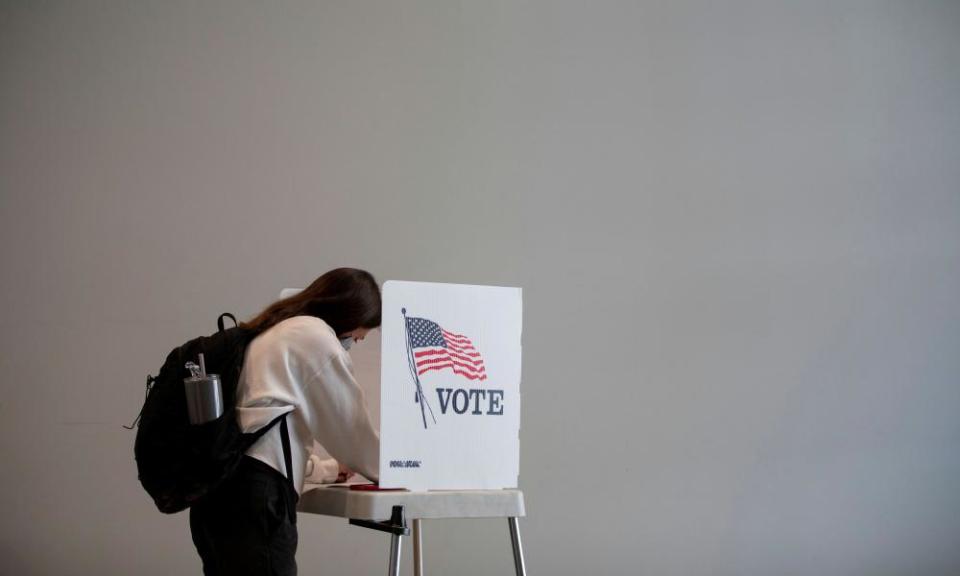Michigan court sides with gun advocates to reverse firearm ban at polls

Tom Lambert says he plans to pull the lever at his designated polling station in a Kentwood church just as he has every election for about the last 10 years – with a gun on his hip and a smile on his face.
The Michigan resident said he doesn’t expect to need to use his firearm while casting a ballot, but he added, “it’s the fight you don’t expect that you prepare for”.
It remains to be seen, however, whether he’s legally allowed to bring his gun this time. Jocelyn Benson, the Michigan secretary of state, earlier this month implemented new rules that ban guns within 100ft of polling stations. Now, after several gun rights advocates, including Lambert, sued, a state court judge struck down the rules on Tuesday, just a week before election day. The attorney general’s office plans to appeal.
Benson developed the rules in response to armed conservative groups announcing plans to monitor voting centers after Trump several weeks ago called on his supporters to “go into the polls and watch very carefully”. Already, armed Trump supporters sparked controversy when they showed up in security uniforms during early voting at a Florida polling location.
Other gun owners have said they won’t monitor the polls but plan to bring their firearms when they vote. Both scenarios have drawn accusations of voter intimidation from some Democrats and liberal-leaning groups. But gun owners and open carry advocates who spoke with the Guardian denied that they are out to intimidate. They claimed they have to prepare for leftwing groups that may try to incite violence, and said they are exercising their second amendment right to defend themselves with a gun no matter where they go.
“I feel like I need to have my gun at all times,” said Jim Makowski, an attorney representing plaintiffs in the suit against the secretary of state. He said there is “no credible threat” of violence from conservative groups, and added that he feels it’s possible that “Antifa” may target polling places, though no groups linked to the leftist antifascist movement have publicly said they intend to do so.
Hope Sprangel, a gun owner in Sandstone Township, a small town with about 3,000 voters, views the question of whether armed groups should be allowed to patrol polling locations as a left v right issue. A group like Black Lives Matter shouldn’t be permitted to monitor polling stations, Sprangel said, but militias can be trusted with patrolling: “I don’t see them as a dangerous group.” (Black Lives Matter hasn’t indicated plans to monitor polls, but the NAACP plans to send unarmed attorneys to monitor polls and alert authorities of any issues.)
Though Sprangel doesn’t expect a confrontation in Sandstone, she is not taking any chances in this political environment. “This year, tempers are flared, people are angry, they’re on edge,” she said.
Though Benson is looking to head off any violence with the voting center gun ban, plaintiffs claim that she failed to follow administrative protocol in developing it and contend that only the GOP-controlled legislature can enact such rules. A judge agreed, though Benson’s office has said the secretary has a “duty and responsibility to protect” voters from intimidation.
Makowski said Michiganders are already protected by state law – those who intimidate voters at the polls face a felony punishable by up to 20 years. With such protections in place, he said there’s “no reason or justification for [Benson’s] legal order”, which he labeled “political”.
Lambert said he and most gun owners support the idea of stopping voter intimidation, “Be aware of Antifa. Be aware of the militia,” he said. But he said banning guns at the polls shouldn’t be part of that strategy.
“I have no problem with someone who is actively trying to intimidate people being stopped, but simply saying firearms are intimidating runs not just counter to reality, but also the US and Michigan constitution,” he said.
Related: How Texas went from low voter turnout to nation's top early voting state
Many don’t buy those claims and view gun owners’ insistence on being armed as a ratcheting of tension. The need to bring firearms to the polls is a symptom of the larger problem and division in American culture, said Gary Slutkin, the founder of Cure Violence Global, which is offering training in how to navigate a potential confrontation on election day.
“People want to do whatever they want even if it’s problematic for others, and perhaps because it’s problematic for others, because the divisions are so large that many people are more interested in causing difficulties than wanting to get along,” he said.
Preparing for a fight isn’t the point of election day, Slutkin noted.
“Your goal that day is to vote, and not to win an argument,” he said. “Even where people think [guns are] necessary for defense, the world is full of better examples of ways to solve things.”

 Yahoo News
Yahoo News 